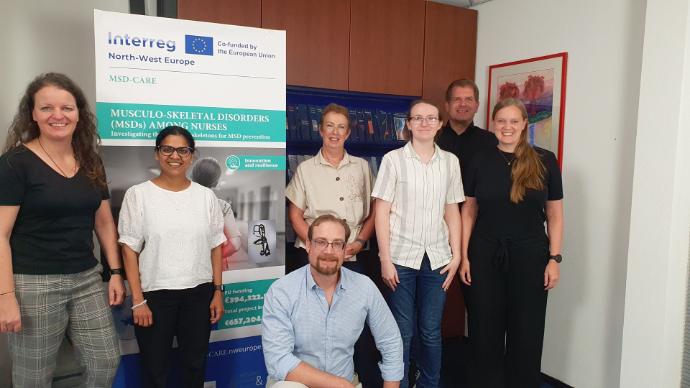MSD-CARE
Overcoming barriers to adoption of innovations preventing MSDs among NWE caregivers
EU Funding
Total Budget
Timeline
Countries
Project summary
Context
Caregivers (including nurses, nursing assistants and informal caregivers) in NWE are coming under increasing pressure. Musculoskeletal disorders (MSDs) are common, and lead to life-affecting injuries, absenteeism and early retirement. Over 50% of caregivers (3,5 million NWE workers, Eurostat) complain about pain caused by MSDs; leading to millions of care-providing days lost. The total cost of MSDs for EU countries in lost productivity, treatment costs and early retirement is estimated at €300bn annually (EXSKALLERATE).
Innovations capable of greatly offsetting the impact of MSDs do exist in the region, but there has been a reluctance throughout the care sector to implement such innovations into daily practice. While the scientific benefits are widely acknowledged, the societal opinion and behavioral interaction towards MSD-preventing technology has not been focused on by decision makers in the sector, resulting in a lack of awareness and appreciation amongst potential users.
Objectives
MSD-CARE will explore the challenge presented by MSDs and investigate soft barriers to innovative technology adoption required to tackle this growing NWE problem. To achieve this, partners will collaboratively host focus groups and trial events, the results of which will be analyzed to assess potential applications on a regional and transnational level.
The findings from these project activities will feed a comprehensive strategy, where members of the quadruple-helix will actively participate in shaping the long-term attitudes to MSD prevention amongst NWE caregivers. MSD-CARE will provide formal and informal caregivers with the necessary decision-making tools for wider adoption of MSD-preventing technologies and recommendations to overcome barriers.
The project outcome will influence the long-term attitudes towards future prevention via informed decisions on the health, social and economic return on investment of promising technologies and methods to reduce the risks of MSDs.
Our Team
Dr. Holger Hoffmann, Dr. Eric Marc Steigmeier, Prof Georgina Gethin, Dr. Erik Prinsen


HAWK
Prof. Dr. Shiney Franz (Lead Partner)
Annika Dlugoszek (PhD Candidate)
Eric Steigmeier (PhD Candidate)
Prof. Dr. Holger Hoffmann
Dr. Robin Diedrichs
RRD
Dr. Erik Prinsen
Dr. Christiane Grünloh-Scientific researcher (not a participant from 01/09/20240
Dr. Kira Oberschmidt-Scientific researcher (not a participant from 01/07/2024)
University of Galway
Prof. Georgina Gethin
Dr. Duygu Seizguin (From April 2025)
Aideen McElvaney (RN and Research Assistant)

Recent photo taken in RRD in Enschede with order from left to right: Dr. Christiane Grünloh (RRD), Prof. Dr. Shiney Franz (HAWK), Prof. Dr. Holger Hoffmann (HAWK), Prof. Georgina Gethin (University of Galway), Aideen McElvaney (University of Galway), Dr. Erik Prinsen (RRD), Annika Dlugoszek (PhD Candidate) (HAWK)
